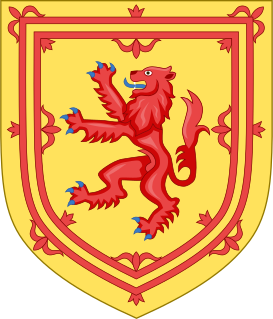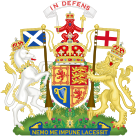
The Lord President of the Court of Session and Lord Justice General is the most senior judge in Scotland, the head of the judiciary, and the presiding judge of the College of Justice, the Court of Session, and the High Court of Justiciary. The Lord President holds the title of Lord Justice General of Scotland and the head of the High Court of Justiciary ex officio, as the two offices were combined in 1836. The Lord President has authority over any court established under Scots law, except for the Supreme Court of the United Kingdom and the Court of the Lord Lyon.

The Court of Session is the supreme civil court of Scotland and constitutes part of the College of Justice; the supreme criminal court of Scotland is the High Court of Justiciary. The Court of Session sits in Parliament House in Edinburgh and is both a trial court and a court of appeal. Decisions of the court can be appealed to the Supreme Court of the United Kingdom, with the permission of either the Inner House or the Supreme Court. The Court of Session and the local sheriff courts of Scotland have concurrent jurisdiction for all cases with a monetary value in excess of £100,000; the plaintiff is given first choice of court. However, the majority of complex, important, or high value cases are brought in the Court of Session. Cases can be remitted to the Court of Session from the sheriff courts, including the Sheriff Personal Injury Court, at the request of the presiding sheriff. Legal aid, administered by the Scottish Legal Aid Board, is available to persons with little disposable income for cases in the Court of Session.

The High Court of Justiciary is the supreme criminal court in Scotland. The High Court is both a trial court and a court of appeal. As a trial court, the High Court sits on circuit at Parliament House or in the adjacent former Sheriff Court building in the Old Town in Edinburgh, or in dedicated buildings in Glasgow and Aberdeen. The High Court sometimes sits in various smaller towns in Scotland, where it uses the local sheriff court building. As an appeal court, the High Court sits only in Edinburgh. On one occasion the High Court of Justiciary sat outside Scotland, at Zeist in the Netherlands during the Pan Am Flight 103 bombing trial, as the Scottish Court in the Netherlands. At Zeist the High Court sat both as a trial court, and an appeal court for the initial appeal by Abdelbaset al-Megrahi.

The courts of Scotland are responsible for administration of justice in Scotland, under statutory, common law and equitable provisions within Scots law. The courts are presided over by the judiciary of Scotland, who are the various judicial office holders responsible for issuing judgments, ensuring fair trials, and deciding on sentencing. The Court of Session is the supreme civil court of Scotland, subject to appeals to the Supreme Court of the United Kingdom, and the High Court of Justiciary is the supreme criminal court, which is only subject to the authority of the Supreme Court of the United Kingdom on devolution issues and human rights compatibility issues.

The Supreme Court is the final court of appeal in the United Kingdom for all civil cases, as well as for criminal cases originating in England, Wales and Northern Ireland. It also hears cases of the greatest public or constitutional importance affecting the whole population.

The senators of the College of Justice are judges of the College of Justice, a set of legal institutions involved in the administration of justice in Scotland. There are three types of senator: Lords of Session ; Lords Commissioners of Justiciary ; and the Chairman of the Scottish Land Court. Whilst the High Court and Court of Session historically maintained separate judiciary, these are now identical, and the term Senator is almost exclusively used in referring to the judges of these courts.

The College of Justice includes the Supreme Courts of Scotland, and its associated bodies.
The Judiciary Act of 1802 was a Federal statute, enacted on April 29, 1802, to reorganize the federal court system. It restored some elements of the Judiciary Act of 1801, which had been adopted by the Federalist majority in the previous Congress, but was repealed by the Democratic-Republican majority earlier in 1802.

The Inner House is the senior part of the Court of Session, the supreme civil court in Scotland; the Outer House forms the junior part of the Court of Session. It is a court of appeal and a court of first instance. The chief justice is the Lord President, with their deputy being the Lord Justice Clerk, and judges of the Inner House are styled Senators of the College of Justice or Lords of Council and Session. Criminal appeals in Scotland are handled by the High Court of Justiciary sitting as the Court of Appeal.
Arthur Campbell Hamilton, Lord Hamilton,, is a Scottish judge and served as Lord Justice General and Lord President of the Court of Session from November 2005 until 8 June 2012, succeeding Lord Cullen.

There are various levels of judiciary in England and Wales — different types of courts have different styles of judges. They also form a strict hierarchy of importance, in line with the order of the courts in which they sit, so that judges of the Court of Appeal of England and Wales are generally given more weight than district judges sitting in county courts and magistrates' courts. On 1 April 2020 there were 3,174 judges in post in England and Wales. Some judges with United Kingdom-wide jurisdiction also sit in England and Wales, particularly Justices of the United Kingdom Supreme Court and members of the tribunals judiciary.

The Scottish Land Court is a Scottish court of law based in Edinburgh with subject-matter jurisdiction covering disputes between landlords and tenants relating to agricultural tenancies, and matters related to crofts and crofters. The Scottish Land Court is both a trial court and an appeal court; hearings at first-instance are often heard by a Divisional Court of one of the Agricultural Members advised by the Principal Clerk. Decisions of the Divisional Court can be appealed to the Full Court, which will consist of at least one legally qualified judicial member and the remaining Agricultural Member. Some cases are heard at first-instance by the Full Court, and these cases may be appealed to the Inner House of the Court of Session.

Colin John MacLean Sutherland, Lord Carloway, is a Scottish advocate and judge who has served as the Lord President of the Court of Session and Lord Justice General since 2015. He was previously Lord Justice Clerk from 2012 to 2015 and has been a Senator of the College of Justice since 2000.
Justices of the Supreme Court of the United Kingdom are the judges of the Supreme Court of the United Kingdom other than the president and the deputy president. The Supreme Court is the highest court of the United Kingdom for civil and criminal matters in the juristictions of England and Wales and Northern Ireland. Judges are appointed by the Queen on the advice of the Prime Minister, who receives recommendations from a selection commission. The number of judges is set by s.23(2) Constitutional Reform Act 2005, which established the Court, but may be increased by the Queen through an Order in Council under s.23(3). There are currently 12 positions: one President, one Deputy President, and 10 Justices. Judges of the Court who are not already peers are granted the style Lord or Lady followed by a surname, territorial designation or a combination of both, for life.

An Act of Sederunt is secondary legislation made by the Court of Session, the supreme civil court of Scotland, to regulate the proceedings of Scottish courts and tribunals hearing civil matters. Originally made under an Act of the Parliament of Scotland of 1532, the modern power to make Acts of Sederunt is largely derived from the Courts Reform (Scotland) Act 2014. Since 2013, draft Acts have also been prepared by the Scottish Civil Justice Council and submitted to the Court of Session for approval.

Scots law is the legal system of Scotland. It is a hybrid or mixed legal system containing civil law and common law elements, that traces its roots to a number of different historical sources. Together with English law and Northern Irish law, it is one of the three legal systems of the United Kingdom.

The judiciary of Scotland are the judicial office holders who sit in the courts of Scotland and make decisions in both civil and criminal cases. Judges make sure that cases and verdicts are within the parameters set by Scots law, and they must hand down appropriate judgments and sentences. Judicial independence is guaranteed in law, with a legal duty on Scottish Ministers, the Lord Advocate and the Members of the Scottish Parliament to uphold judicial independence, and barring them from influencing the judges through any form of special access.
The Administration of Justice (Scotland) Act 1933 is an act of the Parliament at Westminster legislating for Scotland which introduced changes in Scottish legal procedure "following the recommendations of a Royal Commission which reported in 1927".

An Act of Adjournal is secondary legislation made by the High Court of Justiciary, the supreme criminal court of Scotland, to regulate the proceedings of Scottish courts hearing criminal matters. Now primarily derived from the Criminal Procedure (Scotland) Act 1995, the original power to create Acts of Adjournal is derived from an Act of the Parliament of Scotland of 1672. Before promulgation, Acts of Adjournal are reviewed and may be commented upon by the Criminal Courts Rules Council.

The Sheriff Appeal Court is a court in Scotland that hears appeals from summary criminal proceedings in the sheriff courts and justice of the peace courts, and hears appeals on bail decisions made in solemn proceedings in the sheriff court. The Sheriff Appeal Court also hears appeals in civil cases from the sheriff courts, including the Sheriff Personal Injury Court.










